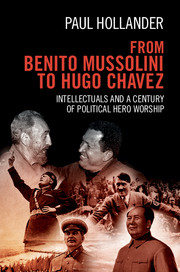Book contents
- Frontmatter
- Contents
- Preface
- 1 Introduction: Intellectuals and Politics
- 2 Mussolini, Fascism, and Intellectuals
- 3 Hitler, Nazism, and Intellectuals
- 4 Stalin, Rakosi, Soviet Communism, and Intellectuals
- 5 Western Intellectuals, Mao's China, and Cambodia under Pol Pot
- 6 Castro, Che Guevara, and Their Western Admirers
- 7 Other Dictators and Their Admirers in More Recent Times
- 8 Conclusions: The Personal and the Political
- Index
2 - Mussolini, Fascism, and Intellectuals
Published online by Cambridge University Press: 19 January 2017
- Frontmatter
- Contents
- Preface
- 1 Introduction: Intellectuals and Politics
- 2 Mussolini, Fascism, and Intellectuals
- 3 Hitler, Nazism, and Intellectuals
- 4 Stalin, Rakosi, Soviet Communism, and Intellectuals
- 5 Western Intellectuals, Mao's China, and Cambodia under Pol Pot
- 6 Castro, Che Guevara, and Their Western Admirers
- 7 Other Dictators and Their Admirers in More Recent Times
- 8 Conclusions: The Personal and the Political
- Index
Summary
Mussolini … tapped into the powerful subterranean human impulse to violent collective action for a utopian goal.
William PfaffBeyond question an amazing experiment is being made here, an experiment in reconciling individualism and socialism, politics and technology. It would be a mistake to allow feelings aroused by … the harsh deeds and extravagant assertions that accompanied the Fascist process … to obscure the potentialities and lessons of the adventure … [of] destiny riding without any saddle and bridle across the historic peninsula.
Charles BeardIn the 1930s travelers returned from Mussolini's Italy, Stalin's Russia and Hitler's Germany praising the hearty sense of common purpose they saw there, compared to which their own democracies seemed weak, inefficient and pusillanimous.
Michael IgnatieffTHE FASCIST CRITIQUES OF MODERNITY AND CAPITALISM
It is important to emphasize at the outset that the attraction of Western intellectuals to right-wing dictators and dictatorships was far less widespread and durable than similar attitudes toward communist dictators and their political systems that persisted past World War II and in some instances up to the present. Correspondingly, there has been far less public awareness of and scholarly research about these largely forgotten expressions of political misjudgment. Nonetheless these more fleeting attitudes are also of importance and somewhat unexpectedly help to better understand the far more intense and durable attraction of the communist systems.
Half-a-century ago Stephen Spender correctly pointed out that “some of the greatest modern writers sympathized with Fascism … [because it] offered political answers to criticisms of modern technological society made by the cultured and the lovers of past civilization.” Likewise Leon Surette observed that “fascism was not perceived in the 1920s as the face of evil – neither by the man in the street, by the media, or by the leaders of democratic nations.”
Richard Wolin proposed a far-reaching reevaluation of fascism and its appeals to intellectuals:
It would be comforting to think that … fascism was an anti-intellectual phenomenon attractive only to criminals and thugs … Many of the [European] continent's leading lights were clamoring to mount the fascist political bandwagon … An enumeration of fascism's literary and philosophical sympathizers … would include Ernst Junger, Gottfried Benn, Martin Heidegger, Carl Schmitt, Robert Brasillach, Pierre Drieu La Rochelle, Louis-Ferdinand Celine, Filippo Marinetti, Gabriele d'Annunzio, W.B. Yeats and Wyndham Lewis …
- Type
- Chapter
- Information
- From Benito Mussolini to Hugo ChavezIntellectuals and a Century of Political Hero Worship, pp. 47 - 82Publisher: Cambridge University PressPrint publication year: 2017



